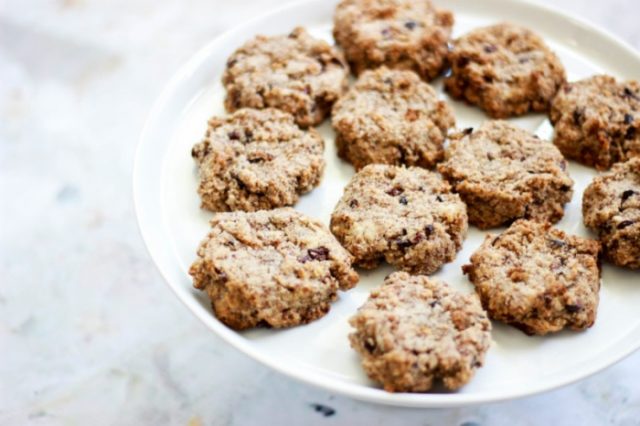You may have seen the opaque brown paste in your local grocery store, where it’s taken up residency along with honey, coconut nectar, maple syrup, and all of the other natural sweeteners. Date paste is a simple enough concept—made from blending dates and water until a viscous liquid forms, it’s being touted as a better-for-you sweetener option. But is it really healthier? What are its best uses? We investigated to see if this new ingredient deserves a spot on your pantry shelf.
How healthy is date paste?
Nutrition experts all agree that date paste stacks up with other alternative sweeteners. “I don’t feel strongly that it’s better than other natural sweeteners, but it’s definitely a good option!” explains Leah Silberman, a registered dietitian and founder of Tovita Nutrition. “While the sugar content per tablespoon amount of many natural sweeteners are comparable, they all offer different health properties. For example, Manuka honey may have helpful antimicrobial properties, while dates are packed with polyphenols, vitamins, and minerals.”
Date paste’s health-promoting powers come largely from its fiber content, which honey and maple syrup lack (coconut sugar is the only other natural sweetener that contains fiber). Fiber can help with feelings of satiety, gut health, and digestion, and one serving of dates can provide nearly 25% of the recommended fiber intake for women. “It’s also a sweetener that works for you since it contains vitamins and minerals like potassium and copper,” says Carlene Thomas, R.D. and founder of OhCarlene.
How do you use date paste?
“Because it’s so sweet and concentrated, a little goes a long way with date paste, which I love,” says Jessica Cording, a registered dietitian and founder of Jessica Cording Nutrition. “Its smooth texture also works very well in things like baked goods you want to keep moist” (to swap it in a recipe, try reducing other liquid ingredients by 25%).
All of that fiber also makes it hard to dissolve date paste completely in lighter drinks (think lemonade or natural sodas), although it complements thicker drinks like smoothies nicely. It’s also great in salad dressings, on roasted veggies, “It’s total bust in recipes like some cookies or breads where you might need the crystalline structure and dissolve-ability of a coconut sugar to cream into a fat,” notes Thomas, who personally recommends date paste as a topping for oatmeal.
What’s the final verdict—should you switch to date paste?
The answer is no—but for a different reason than what you might think. “I advise my clients to choose whichever natural, organic sweetener they enjoy most, because after all, a serving size (typically about one tablespoon) isn’t going to significantly contribute to their overall health,” says Silberman. “I’d rather see my clients enjoy the sweets they indulge in, versus sacrificing taste for minimal health benefits.”










